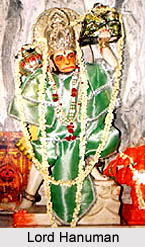 Hanuman, the god of muscular strength, was born on a Saturday, on the full moon day of Hindu month Chaitra (March-April) and the "Hanuman Jayanti" is celebrated to commemorate the birth of Hanuman. He was born of an apsara (celestial maiden) named Anjani and wind-god Marut, hence he is also called Maruti. He is believed to be an avatar (incarnation) of Lord Shiva. Hanuman is worshipped as a symbol of physical strength, perseverance and devotion. The birthday of Hanumana is celebrated in true style because Sri Hanuman is considered the living embodiment of the true Karma Yogi. He is usually worshiped with Rama and Sita but is shown with them in a servile position. Thus, he is considered a more perfect devotee than a deity.
Hanuman, the god of muscular strength, was born on a Saturday, on the full moon day of Hindu month Chaitra (March-April) and the "Hanuman Jayanti" is celebrated to commemorate the birth of Hanuman. He was born of an apsara (celestial maiden) named Anjani and wind-god Marut, hence he is also called Maruti. He is believed to be an avatar (incarnation) of Lord Shiva. Hanuman is worshipped as a symbol of physical strength, perseverance and devotion. The birthday of Hanumana is celebrated in true style because Sri Hanuman is considered the living embodiment of the true Karma Yogi. He is usually worshiped with Rama and Sita but is shown with them in a servile position. Thus, he is considered a more perfect devotee than a deity.
For his unflinching devotion to Rama, he was given a boon by the latter, that he would be remembered in the world, as long as the name `Rama` remained on people`s lips. The character of Hanuman teaches us of the unlimited power that remains untapped within each one of us. Hanuman directed all his energies towards the worship of Lord Ram and his undying devotion made him such that he became free from all physical limitations. Hanuman perfectly exemplifies "Dasyabhava" devotion - one of the nine types of devotions that bond the master and the servant. His greatness lies in his complete merger with his Lord, which also formed the base of his genial qualities.
On Hanuman Jayanti and also on Saturdays and Tuesdays many people keep fast in honour of Hanuman and give special offerings to him. In times of trouble, it is a common faith among Hindus to chant the name of Hanuman or sing the "Hanuman Chalisa". Hanuman temples are among the most common public shrines found in India. The Hanuman Temples come alive before sunrise and the idol of Sri Hanuman is worshipped with oil, a puja that is unique to Hanuman Jayanti.



















